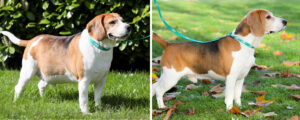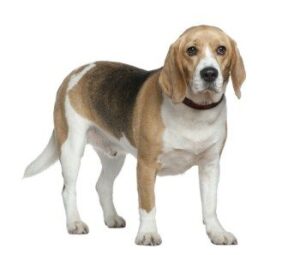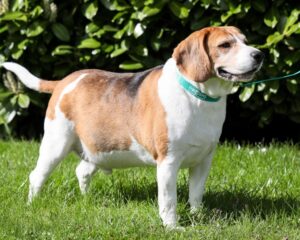Beagles are a popular breed of dog known for their friendly and playful nature. They are also known for their compact size, which makes them an excellent choice for families with limited space. Beagles can be prone to obesity if they are not given the proper exercise and diet. Understanding the ideal weight range for your Beagle and monitoring its weight regularly can help ensure they stay healthy and happy. In this article, we will discuss the average weight of Beagles and tips for maintaining a healthy weight for your furry companion.
Beagles are small to medium-sized breeds of dog, with an average weight range of 18 to 30 pounds for adult males and 13 to 20 pounds for adult females. These weights can vary depending on factors such as the dog’s age, diet, and level of physical activity.
However, it’s important to note that Beagles can be prone to obesity if they are not given the proper exercise and diet.
To maintain a healthy weight for your Beagle, it’s essential to provide them with regular exercise and a balanced diet. A good rule of thumb is to feed them based on their weight and activity level rather than a set amount of food per day.
Also, monitor their weight regularly and consult your veterinarian if you notice any significant changes. Some tips to keep Beagles healthy include measuring their food, providing them with regular walks or runs, and avoiding giving them table scraps or high-calorie treats.
Weight Of Beagles

Beagles are a small to the medium-sized breed of dog, typically weighing between 18 and 30 pounds. Adult males tend to weigh slightly more than adult females. Beagles are sturdy and compact, with a short, dense coat requiring minimal grooming.
Also, they have a muscular, athletic build and a characteristic hound-like appearance, with droopy ears and a long, bushy tail.
Beagles are known for their high energy levels and need for regular exercise. They are famous for families with active lifestyles, as they enjoy going for walks and runs, playing fetch, and exploring the great outdoors.
However, always keep their weight in check, as they can quickly become overweight if they are not given enough exercise or fed too much. Fat beagles are more prone to health problems such as joint problems and diabetes, so monitoring their diet and exercise levels is vital to keep them at a healthy weight.
What is the average weight of a Beagle?
The average weight of a Beagle is between 18 and 30 pounds. Beagles are small to medium-sized breeds of dogs known for their short, smooth coat and droopy ears. They are an energetic and playful breed but can also be stubborn sometimes. Beagles are typically good with children and other pets, making them popular with families.
Beagle weight can vary depending on the sex of the dog. Female Beagles are generally smaller and lighter than males. It is good to note that Beagles are prone to obesity, so ensure to monitor their diet and exercise to keep them at a healthy weight.
Feeding them an appropriate diet and regular exercise can help prevent weight-related health problems such as joint problems, diabetes, and heart disease.
How much should a fully grown Beagle weigh?

A fully grown Beagle should weigh between 18 and 30 pounds. Beagles are small to medium-sized breeds of dogs known for their short, smooth coat and droopy ears. They are an energetic and playful breed but can also be stubborn sometimes. Beagles are typically good with children and other pets, making them popular with families.
However, the ideal weight for a Beagle should be proportionate to its size and body structure. It’s essential to monitor the weight of your Beagle regularly and consult with your veterinarian to ensure they are at a healthy weight. Feeding them an appropriate diet and regular exercise can help prevent weight-related health problems such as joint problems, diabetes, and heart disease.
Is my Beagle overweight or underweight?
There are some signs you can look for to determine if your Beagle is at a healthy weight. An overweight Beagle may have a thick waist and a rounding of the belly. Their ribs may be challenging to feel under a thick layer of fat. They may also tend to pant and become tired more efficiently during exercise.
An underweight Beagle may have a visible waist and quickly feel their ribs. They may also have a dull coat and lack muscle tone.
You can consult with your veterinarian to determine if your Beagle is at a healthy weight. They will consider factors such as breed, age, and activity level when selecting an ideal weight for your dog. Also, a vet may recommend a diet and exercise plan to help your Beagle achieve and maintain a healthy weight.
What is a healthy weight range for a Beagle?

A healthy weight range for a Beagle is between 8.16 kg and 13.61 kg (18 and 30 pounds). However, it’s important to note that individual Beagles may weigh slightly more or less than the average weight range. The ideal weight for a Beagle should be proportionate to its size and body structure, it should have a visible waist, and its ribs should be easily felt but not visible.
An excellent way to check if your Beagle is at a healthy weight is to use the body condition scoring system, which rates the dog‘s body condition on a scale of 1 to 9, with 1 being emaciated and 9 being morbidly obese. A score of 5 is ideal. If your Beagle scores a 4 or 6, they are in the healthy weight range.
If your Beagle scores a 3 or 7, they are slightly underweight or overweight, and you may need to adjust its diet and exercise accordingly. It’s recommended to check your Beagle’s weight regularly and adjust its diet and exercise accordingly to maintain a healthy weight range.
Can a Beagle’s weight affect their health?
Beagle’s weight can affect their health. If a Beagle is overweight, it can put extra stress on its joints and increase its risk for health problems such as osteoarthritis, diabetes, high blood pressure, and respiratory issues. Excess weight can also strain the heart and increase the risk of heart disease.
On the other hand, if a Beagle is underweight, it can cause a weak immune system, poor muscle tone, and an increased risk of injury.
It’s essential to monitor your Beagle’s weight and ensure they are within a healthy weight range. You can do this by consulting a veterinarian and using a body condition scoring system. A healthy diet and regular exercise can also help maintain a healthy weight for your Beagle dog.
How do I know if my Beagle is at a healthy weight?

One way to determine if your Beagle is at a healthy weight is to use the body condition scoring system. This system rates the dog‘s body condition on a scale of 1 to 9, with 1 being emaciated and 9 being morbidly obese. A score of 5 is ideal.
Using this system will help if you run your hands over your dog’s ribs, spine, and hips. You should be able to feel the bones but not see them. If you can see the bones, your dog is underweight. If you cannot handle the bones, your dog is overweight.
Another way to check if your Beagle is at a healthy weight is to observe its physical appearance. A healthy Beagle should have a visible waist, and their ribs should be easily felt but not visible. Their stomachs should not be rounded and have a good muscle tone.
Also, consider their activity level and behavior. A healthy Beagle should have a good energy level and should be able to move around quickly. They should be able to walk, run, and play with ease. If your Beagle is sluggish, lacks energy, or has trouble moving, it may indicate that they are overweight or underweight.
It’s recommended to regularly check your Beagle’s weight and adjust their diet and exercise accordingly to maintain a healthy weight range.
What factors can affect a Beagle’s weight?
Several factors can affect a Beagle’s weight, including diet, exercise, and genetics. Diet is one of the most critical factors affecting a Beagle’s weight. Feeding your Beagle too much or too little can lead to weight gain or loss. Feeding them high-calorie treats or table scraps can also contribute to weight gain.
Monitor their diet and give them the right amount of food corresponding to their weight, age, and activity level.
Exercise is another critical factor that can affect a Beagle’s weight. Beagles are an energetic breed that needs regular exercise to stay healthy and maintain a healthy weight. Lack of exercise can lead to weight gain and lack of muscle tone. Regular exercise can help maintain a healthy weight and keep your Beagle dog active and happy.
Genetics also plays a role in a Beagle’s weight. Some Beagles are predisposed to weight gain, while others may be leaner. It’s essential to consider the genetics of your Beagle when determining a healthy weight range and monitor their weight regularly.
It’s also important to remember that many health conditions, such as hypothyroidism and Cushing’s disease, can also affect a Beagle’s weight.
How can I help my Beagle reach a healthy weight?

Helping your Beagle reach a healthy weight requires a combination of diet, exercise, and monitoring.
Diet is one of the most important factors to consider when trying to help your Beagle reach a healthy weight. You should consult a veterinarian or a professional pet nutritionist to determine the appropriate amount of food for your Beagle based on weight, age, and activity level.
They may also recommend a specific food tailored to your Beagle’s needs. Once you know the appropriate amount of food for your Beagle, you can work on portion control and ensure you adequately feed them. Avoid giving your Beagle high-calorie treats or table scraps, as these can contribute to weight gain.
Exercise is also essential to help your Beagle reach a healthy weight. Beagles are an energetic breed that needs regular exercise to stay healthy and maintain a healthy weight. Regular exercise can help burn off excess calories and build muscle tone. You should aim for at least 30 minutes of exercise per day, including walks, runs, or playtime in a fenced area.
Monitoring your Beagle’s weight is also essential. You should weigh your Beagle regularly and keep track of any changes. This will help you to see if your efforts to help them reach a healthy weight are working. You can also use the body condition scoring system to determine if your Beagle is at a healthy weight.
Can a Beagle’s weight vary depending on their age and sex?
Beagle’s weight can vary depending on their age and sex.
Regarding age, Beagles typically reach their total adult weight around one year but continue to fill out and develop muscle until they are two years old. Some Beagles may be slightly heavier or lighter depending on their growth rate and overall health.
Puppies may weigh less than adult dogs, and seniors may consider less due to decreased muscle mass and activity levels.
Regarding sex, female Beagles are generally smaller and lighter than males. Male Beagles tend to be slightly larger and heavier than females.
However, it’s important to note that individual Beagles may weigh slightly more or less than the average weight range for their sex.
Does the weight of a beagle vary according to their size variation?

The weight of a Beagle can vary according to their size variation. Beagles come in different sizes, some are smaller, and others are larger.
A standard Beagle, the most common size recognized by most kennel clubs, is between 13 to 16 inches tall at the shoulder and weighs between 18 and 30 pounds.
However, there are also miniature Beagles and pocket Beagles, which are smaller versions of the standard Beagle. Miniature Beagles typically weigh between 11 and 15 pounds, and pocket Beagles can weigh as little as 7 pounds. Due to their smaller size, these breed variations will typically weigh less than the standard Beagle.
It’s important to note that regardless of their size, the ideal weight for a Beagle should be proportionate to its size and body structure. A Beagle that is too skinny or overweight may have health issues. It’s essential to monitor their diet and give them the right amount of food corresponding to their weight, age, and activity level.
Conclusion
Beagles are a small to a medium-sized breed of dog known for their short, smooth coat and droopy ears. They have an average weight range of 18 and 30 pounds. However, individual Beagles may weigh slightly more or less than the average weight range. The ideal weight of Beagles should be proportionate to their size and body structure.
Beagles come in different sizes, some can be smaller, and others can be slightly bigger, but as long as their weight is proportionate to their size and they are active and healthy, it is considered a healthy weight. The weight of the Beagle can be affected by factors such as diet, exercise, genetics, and age.
Overweight or underweight Beagles can have health issues. It’s essential to monitor their diet and give them the right amount of food corresponding to their weight, age, and activity level.


